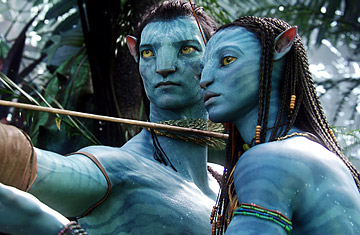
Actors Sam Worthington, left, and Zoe Saldana as Jake and Neytiri in Avatar
All night long, the jokes kept coming on the same subjects: Avatar this, George Clooney that. Sandra Bullock, accepting her award for Best Actress, acknowledged "all the people who didn't" help her, including "George Clooney, who threw me in a pool. I still hold a grudge." Ben Stiller showed up painted like a Na'vi to introduce the makeup category (for which Avatar wasn't nominated), and the Argentine winner of Best Foreign Language Film thanked the Academy "for not considering Na'vi a foreign language."
It's the classic comedy strategy of the have-nots making fun of the haves, and the hoary Oscar tradition of using famous movies and celebrities as the punch lines to jokes understandable to the mass of viewers — most of whom haven't seen, and might not have heard of, the smaller films and actors, who tend to get the awards. Oooh, Avatar, $2.5 billion at the box office ... Heh heh, George Clooney, world's coolest movie star ... Rim shot.
Except that on Sunday night, the haves had not. Clooney did not win an Academy Award, and neither did the film he was nominated for, the early front runner (and utterly Oscar-worthy) Up in the Air, which even failed to cop its expected prize for Best Adapted Screenplay. Avatar won only three of the nine categories for which it was eligible — the door prizes of Cinematography, Art Direction and Special Effects — and its begetter, James Cameron, supped on the special gall of losing Best Picture and Best Director to The Hurt Locker and his ex-wife Kathryn Bigelow, respectively. The Hurt Locker was also up for nine Oscars. It won six, and the evening's bragging rights.
No question, The Hurt Locker is a near perfect war film and an excellent choice for Best Picture. Bigelow's job wrangling this orphan project into shape, and her shot-by-shot mastery of the story, should be considered no less impressive than her swaggering hero's effectiveness in defusing bombs on Baghdad streets. The same goes for Mark Boal's winning screenplay, based on his reporting for a Playboy nonfiction piece about IED squads (which really should have put the script in the Best Adapted Screenplay category).
But The Hurt Locker's Oscar haul had less to do with the movie's merits than with the Academy membership's make-up and mind-set. Remember, to win Best Picture you don't have to make the best picture; you have to make the picture that appeals to the voters, who are older, politically liberal and artistically conservative. Here's how those and other factors may have played in The Hurt Locker's favor — and doomed Avatar.
1. Age. For the Oscar voters, who are at the senior end of the demographic spectrum from the mass audience, which most movies are made for, the most convenient way to see the nominated films is on screeners at home, where The Hurt Locker plays just fine. A Lourdes miracle would be needed for the Academy geriatrics to throw away their walkers and actually go to a theater — the only place Avatar can be appreciated in all its 21st century splendor. Filmmakers rushing to the 3-D format had better learn to be satisfied with the boodle they earn at the box office and not expect to win Oscars for a project that doesn't look like an HBO movie.
